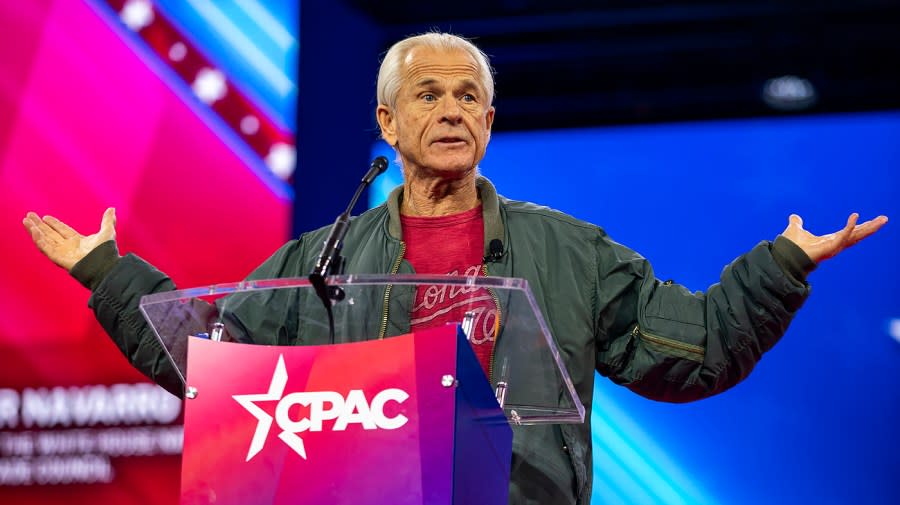Appeals court denies Peter Navarro’s bid to stay out of prison
A federal appeals court on Thursday denied ex-Trump adviser Peter Navarro’s bid to stay out of prison while appealing his conviction for refusing to comply with a congressional subpoena related to the Jan. 6, 2021, attack on the Capitol.
The U.S. Court of Appeals for the District of Columbia Circuit largely affirmed the trial judge’s ruling last month that Navarro’s appeal does not raise a “substantial question of law” and therefore doesn’t warrant his release.
The federal appeals court also found that for Navarro’s arguments on executive privilege to raise substantial questions, it would have required former President Trump to have invoked said privilege — which the court said “did not happen here.”
“Even if executive privilege were available to appellant, it would not excuse his complete noncompliance with the subpoena,” the appeals court wrote in a two-page order. “Appellant makes no claim of absolute testimonial immunity, nor could he.”
“A properly asserted claim of executive privilege would not have relieved him of the obligation to produce unprivileged documents and appear for his deposition to testify on unprivileged matter,” the court order continues.
Navarro, 74, was convicted last year on two counts of contempt of Congress — one for failing to produce documents related to the Jan. 6 probe and another for skipping his deposition. He was sentenced to four months in prison.

Former Trump advisor Peter Navarro speaks during the Conservative Political Action Conference (CPAC) at the Gaylord National Resort and Convention Center in National Harbor, Md., on Saturday, February 24, 2024. (Greg Nash)
The former Trump economic adviser has been ordered to report to a Miami prison Tuesday, which would make him the first key Trump adviser to serve jail time over efforts to overturn the 2020 election.
U.S. District Judge Amit Mehta, who oversaw Navarro’s trial, had barred his attorneys from using executive privilege as a defense after finding he failed to prove privilege was ever invoked by Trump.
In court filings, Navarro’s attorneys said his defense was “hamstrung” by the “open question” of whether a president can direct his subordinates not to testify before Congress. Navarro himself told the judge during his sentencing he had an “honest belief” that privilege had been invoked, prompting him to ignore the House Jan. 6 committee’s requests for documents and an interview.
The Hill requested comment from Navarro attorney Stanley Woodward.
At trial, federal prosecutors said Navarro showed “utter disregard” for the House panel’s probe and “utter contempt for the rule of law.”
“The committee was investigating an attack on the very foundation of our democracy,” Assistant U.S. Attorney John Crabb said. “There could be no more serious investigation undertaken by Congress.”
Former White House adviser Steve Bannon was convicted on two counts of contempt of Congress last year, too, and sentenced to four months in prison. But a different judge ruled he could remain free pending appeal. Bannon’s appeal was argued in November; he still has not served any time.
Top Stories from The Hill
Manhattan DA won’t oppose 30-day delay of Trump’s New York hush money trial
Jordan threatens Fani Willis with contempt over subpoena on federal grants
Appeals court denies Peter Navarro’s bid to stay out of prison
Navarro told reporters after his conviction last year that he expects his case to reach the Supreme Court over the questions it raises regarding executive privilege for high-ranking White House staff.
“I am willing to go to prison to settle this issue. I’m willing to do that. But I also know that the likelihood of me going to prison is relatively small, because we are right on this issue,” Navarro said at the time.
For the latest news, weather, sports, and streaming video, head to The Hill.


